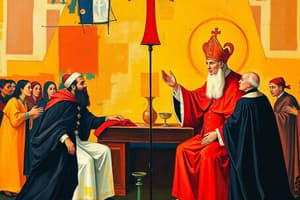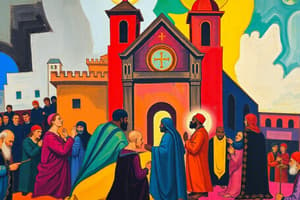Podcast
Questions and Answers
What is the primary role of the pope within the Catholic Church?
What is the primary role of the pope within the Catholic Church?
- To rule over the Church strictly
- To translate the Bible into various languages
- To engage in political power struggles
- To guide the Church in faith and spirituality (correct)
What did the Council of Trent aim to address regarding the Church?
What did the Council of Trent aim to address regarding the Church?
- The selling of indulgences
- The need for more elaborate rituals
- Expansion of papal territory
- Clerical corruption and training of priests (correct)
How does the Catholic Church view the authority of the Pope?
How does the Catholic Church view the authority of the Pope?
- As a divine role grounded in Scripture (correct)
- As interchangeable with local leaders
- As irrelevant in modern society
- As derived solely from political influence
What was the intention behind translating the Bible into common languages?
What was the intention behind translating the Bible into common languages?
What is incorrect about the Catholic Church's sale of indulgences?
What is incorrect about the Catholic Church's sale of indulgences?
What role does the Church believe its leadership plays in interpreting the Bible?
What role does the Church believe its leadership plays in interpreting the Bible?
Why does the pope engage in politics according to the Catholic Church's view?
Why does the pope engage in politics according to the Catholic Church's view?
How does the Church respond to accusations of corruption within its ranks?
How does the Church respond to accusations of corruption within its ranks?
What was the primary reason the Church initially delayed translating the Bible?
What was the primary reason the Church initially delayed translating the Bible?
How did the Protestant Reformation impact Christianity according to the content?
How did the Protestant Reformation impact Christianity according to the content?
What is the Catholic Church's mission as described?
What is the Catholic Church's mission as described?
Which of the following reflects the Catholic Church's approach to Bible translations over time?
Which of the following reflects the Catholic Church's approach to Bible translations over time?
What justification was given for the methods used during the Spanish Inquisition?
What justification was given for the methods used during the Spanish Inquisition?
According to the content, what consequence did the Reformation have on authority in Christianity?
According to the content, what consequence did the Reformation have on authority in Christianity?
What was a primary belief of the Church regarding its role in society?
What was a primary belief of the Church regarding its role in society?
What was the purpose of the Spanish monarchy's involvement in the Inquisition?
What was the purpose of the Spanish monarchy's involvement in the Inquisition?
What was a common practice in the Catholic Church during the Reformation related to leadership appointments?
What was a common practice in the Catholic Church during the Reformation related to leadership appointments?
How did the Church respond to the issues of corruption during the Reformation?
How did the Church respond to the issues of corruption during the Reformation?
Which statement reflects the author's view on nepotism within the Church?
Which statement reflects the author's view on nepotism within the Church?
What is the original purpose of indulgences in the Catholic Church?
What is the original purpose of indulgences in the Catholic Church?
What do Catholics believe regarding the Eucharist?
What do Catholics believe regarding the Eucharist?
Which of the following doctrines introduced during the Reformation is NOT supported by the Bible according to the author?
Which of the following doctrines introduced during the Reformation is NOT supported by the Bible according to the author?
What does James 2:24 convey regarding salvation?
What does James 2:24 convey regarding salvation?
What consequence did the Reformation have according to the author?
What consequence did the Reformation have according to the author?
Flashcards
Pope's Authority
Pope's Authority
The Catholic Church believes the pope's authority comes from Jesus' words to Peter in Matthew 16:18. The pope's role is to guide the Church, not rule over it.
Council of Trent
Council of Trent
A council held by the Catholic Church in the 16th century to address issues like corruption within the Church. It aimed to reform practices and ensure the Bible's accurate translation.
Indulgences
Indulgences
The Catholic Church teaches that indulgences were never about buying salvation, but reducing the consequences of forgiven sins (purgatory). Salvation comes from faith, repentance, and God's grace.
Pope's Role in Politics
Pope's Role in Politics
Signup and view all the flashcards
Pope and Priests' Authority
Pope and Priests' Authority
Signup and view all the flashcards
Council of Trent's Impact
Council of Trent's Impact
Signup and view all the flashcards
Biblical Interpretation
Biblical Interpretation
Signup and view all the flashcards
Salvation's Source
Salvation's Source
Signup and view all the flashcards
Church's Mission
Church's Mission
Signup and view all the flashcards
Scripture's Importance
Scripture's Importance
Signup and view all the flashcards
Reformation's Impact
Reformation's Impact
Signup and view all the flashcards
Catholic Church's Unity
Catholic Church's Unity
Signup and view all the flashcards
Inquisition's Purpose
Inquisition's Purpose
Signup and view all the flashcards
Conversos
Conversos
Signup and view all the flashcards
Inquisition Methods
Inquisition Methods
Signup and view all the flashcards
Church and Monarchy
Church and Monarchy
Signup and view all the flashcards
Nepotism in the Reformation
Nepotism in the Reformation
Signup and view all the flashcards
Impact of the Reformation
Impact of the Reformation
Signup and view all the flashcards
Original Purpose of Indulgences
Original Purpose of Indulgences
Signup and view all the flashcards
The Real Presence of Jesus
The Real Presence of Jesus
Signup and view all the flashcards
Sola Fide vs. Sola Scriptura
Sola Fide vs. Sola Scriptura
Signup and view all the flashcards
Role of Church Authority
Role of Church Authority
Signup and view all the flashcards
Political Exploitation of the Reformation
Political Exploitation of the Reformation
Signup and view all the flashcards
The Catholic Church's Legacy
The Catholic Church's Legacy
Signup and view all the flashcards
Study Notes
Papal Authority
- The Catholic Church believes the pope's authority comes from Jesus' words to Peter in Matthew 16:18
- The pope's role is to guide the Church, not rule over it
- The pope's authority is derived from Scripture and grounded in Scripture.
- The Church believes the Bible should be interpreted with the help of church leaders.
- Translating the Bible into common languages was to preserve its true meaning.
- The Council of Trent ensured accurate translations, making Scripture clear.
Indulgences and Salvation
- The Catholic Church never sold salvation.
- Indulgences aimed to reduce the consequences of forgiven sins (purgatory), not buy salvation.
- Salvation comes from faith, repentance, and God's grace, not indulgences
- Indulgences were meant to guide people toward spiritual growth, not replace true repentance.
Papal Authority and Politics
- The Pope's involvement in politics was for preserving peace and protecting Christendom.
- The Pope's role is divinely ordained (Matthew 16:18-19).
- The Pope's leadership helped keep religion and society united during times of instability.
- Papal authority was necessary to maintain order in the world while aligning with God's will.
The Pope and Priests as Divinely Chosen
- The pope's authority is rooted in Biblical scripture; Jesus appointed Peter.
- The Pope and priests are responsible for preserving the Gospel's truth and leading the Church.
- Accusations of corruption don't diminish the Church's divinely ordained leadership.
- Church leadership is passed down through the centuries from God.
Clergy Misconduct and Corruption
- The Church has always worked to correct clergy misconduct and corruption.
- The Council of Trent (1545-1563) aimed to address corruption and improve priestly training.
- Misconduct by individuals doesn't change Church's mission to serve and guide people in their faith.
The Bible and Translation Issues
- The Church has always valued Scripture.
- The Bible wasn't translated earlier to preserve the true meaning of the texts.
- The Church aims for accurate translation of God's word in people's languages.
The Protestant Reformation and Religious Division
- The Reformation led to divisions in Christianity.
- The Catholic Church aims to maintain unity around the true teachings of Christ.
- The Catholic Church upholds a consistent, unified message of faith.
The Catholic Church's Mission and Modern Relevance
- Catholics aim to lead people to God through sacraments, prayer, and service.
- The Reformation emphasized rituals and practices over Christ's teachings.
- The Church's authority is to ensure the Gospel is taught to guide people to eternal life.
- The Church's mission is relevant in today's world.
The Spanish Inquisition
- The Spanish Inquisition aimed for order after the Reconquista.
- Religious unity was seen as essential for national stability, particularly regarding converted Jews (conversos).
- The use of harsh methods was a means to ensure religious unity during a unstable period.
Addressing Nepotism
- Nepotism involved appointing family members to positions of power in the Church and throughout 16th-century society
- Despite occasional nepotism, the Church undertook reforms, notably the Council of Trent.
- Similar issues of nepotism were found in other organizations during that time period.
General Issues
- The Catholic Church is the true foundation of Christianity, uniting the faith and teachings of Jesus.
- Though the Church has gone through initial issues like in the time of the Reformation, the Church has also always been reformed and rectified these issues for the sake of preserving God's true meaning.
- The Catholic Church ensures the true message of Christ is preserved, including the purpose (though sometimes misapplied) of indulgences and the centrality of the Eucharist in faith as described by Jesus himself.
Studying That Suits You
Use AI to generate personalized quizzes and flashcards to suit your learning preferences.




